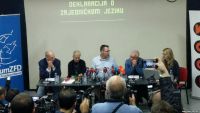Purist approach to language in Bosnian schools challenged
On March 30, the conference participants signed a Declaration of Common Language in Sarajevo contending that all languages spoken in the Balkan states that formerly spoke Serbo-Croatian should be considered the same. The declaration was drafted by 30 linguists and signed by over 200 researchers, writers, scientists, and activists. The research was sponsored by the Krokodil a linguistic and cultural organization based in Belgrade and partnered with ForumZFD, the Balkan branch of a German organization promoting peace.
In an attempt to challenge growing nationalism in the region linguists argue that people in the four ex-Yugoslav republics actually speak a polycentric language - a language which has several different standardised versions in different countries.
“We, the signatories of this declaration, believe that the existence of a common polycentric language does not call into question the individual right to express one’s belonging to different nations, regions or countries,” the declaration says.
Although there are four separate official languages - Bosnian, Croatian, Montenegrin and Serbian - speakers of each language understand each other perfectly, despite linguistic variations.
“Nationalism is increasing by introducing a purist approach towards language in schools and in media, because people, in relation to the choice of words, are trained to associate the term ‘good’ with their own nation, and the term ‘bad’ with other nations,” explained Croatian linguist Snjezana Kordic, who worked on drafting the declaration.
“The declaration has an educational role because it explains that a polycentric language is a normal thing in the world because English, German, Spanish and many others are that type of language,” said Kordic, who has been criticised by conservative linguists in Croatia.
She suggested that referring to a common language could potentially lead to the end of the phenomenon of schools being divided according to which language the pupils speak, as happens in some places in Croatia and Bosnia - and “stop producing future generations of nationalist party voters”.

